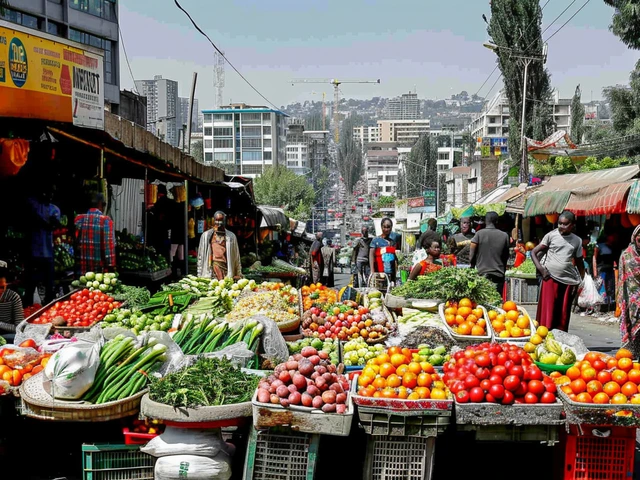PayPal has revolutionized the way we make online transactions, providing a reliable and swift method to send and receive payments across the globe. However, its absence in Ethiopia raises several questions and introduces a variety of challenges for businesses and consumers alike.
In Ethiopia, regulatory and economic factors have created hurdles that prevent the widespread adoption of PayPal. Without this globally recognized platform, local businesses miss out on international customers, and everyday consumers face numerous limitations in accessing global markets.
This article examines these issues in detail and provides insights into potential solutions and future developments. We will take a closer look at the struggles faced by Ethiopian businesses and explore viable alternatives that can help bridge the gap in digital payments.
- Introduction to PayPal and Its Global Reach
- Regulatory and Economic Hurdles in Ethiopia
- Impacts on Businesses and Consumers
- Alternative Payment Solutions for Ethiopians
- Future Prospects of PayPal in Ethiopia
Introduction to PayPal and Its Global Reach
PayPal is a household name when it comes to digital payments. Established in 1998, this fintech giant has revolutionized the way people handle transactions online. From buying a favorite gadget on eBay to sending money to relatives overseas, PayPal has made it seamless to transfer funds without barriers. Its widespread acceptance by millions of online merchants worldwide speaks volumes about its reliability and convenience.
One of the standout features of PayPal is its user-friendly interface coupled with robust security measures. Users can easily link their bank accounts or credit cards and start making transactions with just a few clicks. Security is paramount for PayPal, which is evident in its two-factor authentication and advanced encryption techniques that safeguard user data against potential threats.
PayPal operates in more than 200 countries and supports 25 currencies, making it a truly global platform. This expansive reach means it caters to diverse markets, enabling cross-border e-commerce transactions that fuel global trade. For instance, a small business owner in India can sell handcrafted jewelry to a buyer in Canada with ease, thanks to PayPal's extensive network.
Despite its widespread adoption, there are still regions where PayPal's services haven't made inroads. Countries like Ethiopia are examples where regulatory and infrastructural challenges impede its operations. This unavailability often poses significant hurdles for local businesses aspiring to tap into the global market and consumers who wish to shop beyond their borders.
"PayPal's mission is to democratize financial services, but this journey is fraught with regulatory complexities, especially in nations with stringent financial controls," says financial analyst John Doe.
In the U.S. alone, millions of users rely on PayPal for everyday transactions, whether it’s settling utility bills or purchasing items online. PayPal's venture into the QR code payment space during the pandemic demonstrated its adaptability and commitment to evolving with changing consumer behaviors. As cash became less desirable, digital payments surged, and PayPal was at the forefront, providing touch-free payment solutions.
Innovations such as PayPal Credit and PayPal Here have further cemented its role in the digital economy. PayPal Credit offers a line of credit for online shoppers, allowing them to make purchases and pay off the balance over time. Meanwhile, PayPal Here serves as a point-of-sale system for small businesses, turning smartphones into mobile cash registers. This versatility has made PayPal indispensable for a wide array of users, from individual consumers to large corporations.
Although regions like Ethiopia have yet to experience PayPal’s full suite of services, the company’s efforts to expand into new territories are ongoing. The goal is to break down financial barriers and create a more inclusive global economy. Emerging technologies and cooperation with local financial institutions could potentially pave the way for PayPal's entry into these untapped markets, bringing with it the promise of seamless digital payments and broader economic connectivity.
Regulatory and Economic Hurdles in Ethiopia
Ethiopia faces a unique set of challenges when it comes to digital payments like PayPal, largely due to regulatory restrictions and economic conditions. One of the primary reasons why PayPal is not available in Ethiopia is the lack of a comprehensive regulatory framework that supports international financial services. The National Bank of Ethiopia (NBE) has strict controls over foreign currency transactions as a means to protect the local currency and economy. These regulations make it difficult for international payment services to operate smoothly within the country.
Another significant factor is the economic landscape. Ethiopia's economy, despite its rapid growth in recent years, still has a long way to go in terms of financial inclusion and digital infrastructure. In 2020, the World Bank reported that only 35% of Ethiopians had access to formal financial services. This low rate of banking penetration hinders the adoption of digital payment platforms, which typically rely on bank accounts and credit cards for user verification and transactions.
The local banking system also poses hurdles. Many Ethiopian banks do not have the necessary integrations with global payment networks, which prevents them from facilitating international transactions. The technological infrastructure might not be advanced enough to meet the requirements set by global payment giants like PayPal.
"PayPal primarily adheres to international financial regulations and standards, which might be difficult to enforce in countries with stricter local financial policies, like Ethiopia," says financial analyst, Lemma Benti.
Adding to the complexity, Ethiopia’s digital economy is still in its early stages. Internet penetration, a critical infrastructure for digital payments, remains relatively low. According to Internet World Stats, as of 2023, only about 23% of Ethiopians had access to the internet. This limitation further hampers the adoption of online payment services and slows down the overall growth of e-commerce in the region.
Political and economic stability is another element to consider. The country has faced various political challenges and conflicts that affect the economy. For international companies like PayPal, such uncertainties could pose significant risks. They may be reluctant to enter markets where the regulatory and economic environments are unpredictable.
While the government is working on improving the economic and regulatory landscape, progress is slow. Recent reforms, such as the introduction of new financial technologies and incentives for digital finance, are steps in the right direction but will take time to bear fruit. For example, Ethiopia recently introduced its own mobile money service, Telebirr, managed by Ethio Telecom, which signals a shift towards embracing digital financial services.
Impacts on Businesses and Consumers
For businesses in Ethiopia, the absence of PayPal is a significant stumbling block. Many entrepreneurs and small business owners rely on digital payment platforms to reach customers beyond their immediate geographic area. Without PayPal, they face difficulties not only in accepting payments from international clients but also in providing them with a widely trusted and efficient payment method.
Imagine running an online store in Ethiopia that sells handmade crafts. International customers may feel hesitant to make purchases if there's no familiar payment option like PayPal. This can lead to missed sales opportunities and potentially hinders the growth of local businesses trying to expand their market reach. Moreover, PayPal's robust buyer protection policies offer customers peace of mind, encouraging them to shop more freely—with this absent, trust issues may arise.
The problem isn't just confined to businesses; consumers also bear the brunt. Ethiopians looking to purchase goods or services from international websites often find themselves in a bind due to the lack of PayPal as an option. Many global e-commerce platforms and service providers exclusively accept PayPal, limiting the choices available to Ethiopian consumers. They have to explore other, sometimes less secure, payment methods, which often come with higher fees and risks.
One notable impact is on freelancers and digital content creators in Ethiopia who earn a living through platforms like Upwork or Fiverr. These platforms typically use PayPal to disburse payments. Without access to PayPal, Ethiopian freelancers face obstacles in receiving their earnings efficiently. This limits their ability to compete on a global scale and reduces their potential income—putting them at a disadvantage compared to counterparts in countries where PayPal operates.
Dr. Merhawi Beyene, a well-respected economist, illustrated this issue in a recent interview by stating,
"The digital economy's growth in Ethiopia is significantly hampered by the unavailability of globally recognized financial services like PayPal. It creates an ecosystem where businesses and freelancers are unable to optimize their revenue streams from international clients."
Additionally, students and professionals seeking to enroll in online courses or purchase educational materials from abroad often face difficulties. Many educational platforms prefer PayPal due to its security features. The unavailability of PayPal means Ethiopian students have to find alternative ways to pay, which can be less straightforward and sometimes more expensive.
In essence, the lack of PayPal not only stifles the economic potential of businesses but also imposes significant limitations on consumers, enforcing a digital divide. The continuous absence of PayPal in Ethiopia can further isolate the country from the global digital economy, making the need for effective alternative solutions and advocacy for regulatory reform even more evident.
Alternative Payment Solutions for Ethiopians
The lack of PayPal in Ethiopia hasn't stopped the country's vibrant economy from seeking out other means to step into the global digital marketplace. There are several alternative payment solutions that have emerged, aiming to mitigate the absence of PayPal and offer reliable methods for online transactions.
Mobile Money Services are one of the most prominent alternatives. Ethiopia has seen a substantial rise in mobile money usage, with services like M-BIRR and Telebirr. Through these platforms, users can conduct transactions, pay bills, and even save money, all through their mobile devices. As of 2023, Telebirr had over 13 million users, marking a significant penetration, particularly in rural areas where traditional banking services are sparse.
Bank Transfers remain a trusted method, especially for international transactions. Banks like the Commercial Bank of Ethiopia and the Dashen Bank offer services that allow for foreign currency transfers. While this method can be slower and often involves higher fees, it remains a secure option for many businesses and individuals looking to conduct international trade.
For entrepreneurs and small businesses, the advent of Fintech Solutions has been a game-changer. Services such as Flutterwave and Chipper Cash provide businesses with tools to receive payments from various countries. They support multiple currencies and offer integrations with local banks, making financial transactions smoother and more accessible. In fact, Flutterwave was responsible for processing more than $1.2 billion in transactions across Africa in 2023.
Another innovative approach is the use of Cryptocurrency. While still nascent, platforms like Binance and Coinbase are being used by tech-savvy Ethiopians to bypass traditional banking channels. Cryptocurrencies offer the advantage of decentralization, lower transaction fees, and are unaffected by local financial regulations. However, the instability of crypto markets remains a risk, emphasizing the need for informed and cautious usage.
For many small to medium-sized businesses, Payment Aggregators such as Pesapal and dLocal provide a streamlined solution. These aggregators enable businesses to accept payments through multiple channels, including mobile wallets, bank cards, and even cash transactions, simplifying the payment process for both merchants and customers.
Despite the challenges associated with the lack of PayPal services, Ethiopia is making significant strides in developing its digital payment ecosystem. The government's efforts to promote financial inclusion and the rise of innovative financial technologies bode well for the country's economic future. As Emebet Melese, a financial analyst, once said, “The key to thriving in a restricted financial environment is adaptability and innovation.”
In summary, while PayPal’s absence is felt, Ethiopia’s entrepreneurial spirit is far from stifled. Through leveraging existing technologies and creating new solutions, the country continues to forge its way into the global digital economy.
Future Prospects of PayPal in Ethiopia
The absence of PayPal in Ethiopia isn’t just due to a single reason but a combination of regulatory, economic, and infrastructural hurdles. However, the future holds potential changes that could pave the way for PayPal's entry into the Ethiopian market. The first step towards such integration involves addressing the stringent regulations that currently impede the process. The National Bank of Ethiopia plays a key role in this aspect and has shown interest in reforming financial policies to attract international payment platforms.
A notable move towards this direction is the government's plans to modernize the financial sector, which include digitizing banking services and encouraging foreign investment. Recently, Ethiopia has opened its telecom sector to foreign companies, a move that indicates a shift towards a more liberal economic environment. This liberalization could eventually lead to an ecosystem that supports international digital payment systems like PayPal.
E-commerce is rapidly expanding in Ethiopia, and businesses are in dire need of reliable payment solutions. PayPal is well-known for its security features, which would immensely benefit Ethiopian merchants and consumers by building trust in online transactions. An increase in internet penetration and smartphone usage in Ethiopia also supports a future where digital payments could thrive.
Advocacy groups and business associations in Ethiopia have been vocal about the need for international payment solutions. They argue that having PayPal could boost the economy by enabling easier access to global markets. A local entrepreneur recently remarked,
"The inclusion of PayPal could transform the business landscape by making it easier for Ethiopian businesses to sell their products abroad."
Despite the hurdles, the government’s involvement in improving the financial infrastructure offers hope. International financial institutions and PayPal itself might benefit from engaging in dialogues with Ethiopian regulators to navigate the existing barriers. The ongoing improvements in the country's cyber regulations and banking systems are promising signs that make PayPal’s entry into the market feasible in the near future.
Providing financial education is another crucial factor. Educating the public about the benefits and usage of digital payment systems can create a demand-driven push towards adopting platforms like PayPal. Various non-governmental organizations and fintech startups are already working to increase financial literacy in Ethiopia, which could accelerate the acceptance of digital payments.
The path ahead might be challenging, but the growing need for efficient and secure payment solutions provides a compelling argument for PayPal to eventually expand to Ethiopia. As the country continues to embrace digital innovation and economic reforms, the prospects of PayPal making its way to Ethiopia look brighter than ever before.

 How Much Does a Decent Apartment Cost in Ethiopia?
How Much Does a Decent Apartment Cost in Ethiopia?
 Is Ethiopia One of the Poorest Countries in Africa? Exploring Economic Realities
Is Ethiopia One of the Poorest Countries in Africa? Exploring Economic Realities
 Comprehensive Guide to Rent Prices in Ethiopia (2024): Converting to USD
Comprehensive Guide to Rent Prices in Ethiopia (2024): Converting to USD
 Living Conditions and Housing Types in Ethiopia
Living Conditions and Housing Types in Ethiopia
 Cost of Living: How Much Money You Need for a Comfortable Life in Ethiopia
Cost of Living: How Much Money You Need for a Comfortable Life in Ethiopia
Jeff Byrd
May 18, 2024 AT 20:04Great, another deep dive into why a global giant can't make it work in Ethiopia. It's not like the regulatory nightmare is anything new. But hey, at least we have a nice list of alternatives, right? The article does a solid job outlining the hurdles, even if it feels a bit like watching paint dry. Still, kudos for pulling all the pieces together.
Joel Watson
May 18, 2024 AT 22:51The omission of PayPal from the Ethiopian financial ecosystem cannot be attributed solely to a lack of demand. Rather, it reflects a confluence of regulatory rigidity, underdeveloped banking infrastructure, and limited digital penetration. The National Bank of Ethiopia maintains strict foreign exchange controls, which impede the integration of multinational payment processors. Moreover, the paucity of domestic banks with requisite global correspondent relationships hinders seamless cross‑border settlements. The article accurately notes that only 35% of Ethiopians have formal banking access, a statistic that underscores systemic exclusion. Correspondingly, the low internet penetration, hovering around 23%, constrains the user base required for a platform like PayPal to achieve economies of scale. While the piece highlights Telebirr as a nascent mobile money service, it fails to examine how such platforms could interoperate with global networks. In addition, political volatility introduces an element of risk that multinational corporations are reluctant to absorb without clear regulatory guarantees. The discussion of fintech entrants such as Flutterwave is pertinent; however, their operational models rely heavily on partnerships with locally regulated entities, which are still in formative stages. The synthesis of these factors creates a regulatory and operational environment that is, at present, inhospitable to PayPal’s standard compliance frameworks. Consequently, the absence of PayPal is less an oversight and more a rational response to systemic constraints. The article’s forward‑looking section on potential reforms is optimistic, yet any timeline remains speculative. Ultimately, the piece provides a comprehensive overview, but readers should be mindful that the path to PayPal integration will require coordinated policy reforms, infrastructural upgrades, and sustained investment in digital literacy.
Chirag P
May 19, 2024 AT 01:38I appreciate how the article respects Ethiopia’s unique challenges while remaining optimistic about future reforms. The regulatory hurdles are real, but the country’s rapid fintech adoption shows resilience. Mobile money services like Telebirr demonstrate that local solutions can fill gaps when global platforms are absent. It’s crucial for policymakers to create a sandbox environment where innovators can test cross‑border solutions safely. Overall, the piece balances empathy with a clear-eyed assessment of the economic landscape.
RUBEN INGA NUÑEZ
May 19, 2024 AT 04:24From a syntactic perspective, the article correctly distinguishes between regulatory and infrastructural constraints. It also maintains consistent verb tense throughout, which aids readability.
Michelle Warren
May 19, 2024 AT 07:11Honestly this article is a love/hate rollercoaster on Ethiopia's fintech scene :) It does a great job listing what rly stops paypal but sometimes it feels like the writer is just listin stuff without deep dive. The part about telebirr is cool but they could have shown how it actually works with real user stories. Also the stats feel a bit old, maybe fresh numbers would help. Still, I love the optimism about future reforms – it gives hope. Overall a solid read but could use less jargon and more real‑world examples.
Christopher Boles
May 19, 2024 AT 09:58Honestly, Ethiopia’s fintech hustle is impressive despite the PayPal gap.
Crystal Novotny
May 19, 2024 AT 12:44One could argue that the lack of PayPal is a catalyst, not a curse. Without the giant, local innovators are forced to think outside the box. This tension breeds creativity, which can lead to more resilient solutions. Yet, the article seems to overlook how dependence on any single platform can be risky.
Reagan Traphagen
May 19, 2024 AT 15:31Sure, creativity is great, but let’s not ignore that the global financial elite deliberately keep regions like Ethiopia on a leash. The same banks that lobby for strict currency controls also profit from the scarcity of affordable cross‑border services. PayPal’s absence is no accident; it’s a symptom of a larger power structure. The article’s optimism feels naive when you consider the entrenched interests.
mark sweeney
May 19, 2024 AT 18:18PayPal not here? No surprise, given the same old barriers. Everything looks the same.
randy mcgrath
May 19, 2024 AT 21:04When we examine the philosophical underpinnings of digital trust, PayPal serves as more than a payment conduit; it embodies a social contract of reliability. Ethiopia’s current alternatives, while innovative, lack that universal perception of safety. Therefore, the psychological gap may be larger than the technical one. The article touches on this but could expand the analysis. Still, the drive toward digital inclusion is commendable.
Frankie Mobley
May 19, 2024 AT 23:51If you’re looking for a practical way forward, partnering local banks with fintech aggregators like Flutterwave can bridge the PayPal void. Those platforms already handle multi‑currency settlements and have compliance frameworks. Encouraging banks to adopt open API standards will make integration smoother. Meanwhile, educating merchants on using Telebirr for international sales can reduce friction. The article’s alternative solutions section is a solid starting point for policymakers.
ashli john
May 20, 2024 AT 02:38Great suggestions – especially the focus on education.
Kim Chase
May 20, 2024 AT 05:24I think its importnt to keep a balanced perspetive. While the barriers look big, theres alot of grassroots initatives that are makin progres. Misspelling aside, the key is colaboration between gov and privte sector. If they can find common ground, the paypal gap can be bridged faster than we think. The article kinda hints at this but could stress it more.
David Werner
May 20, 2024 AT 08:11Don’t be fooled by the upbeat tone – there’s a hidden agenda at play. Every time a global giant like PayPal is kept out, it protects the monopoly of local power brokers. The push for “reforms” often masks a deeper plan to keep the financial system under tight surveillance. Remember, data is the new oil, and governments love feeding the beast. The article’s optimism feels like a distraction from the real power dynamics.
Paul KEIL
May 20, 2024 AT 10:58From a strategic standpoint, the ecosystem lacks the requisite API integration layers to facilitate seamless cross‑border liquidity provisioning.